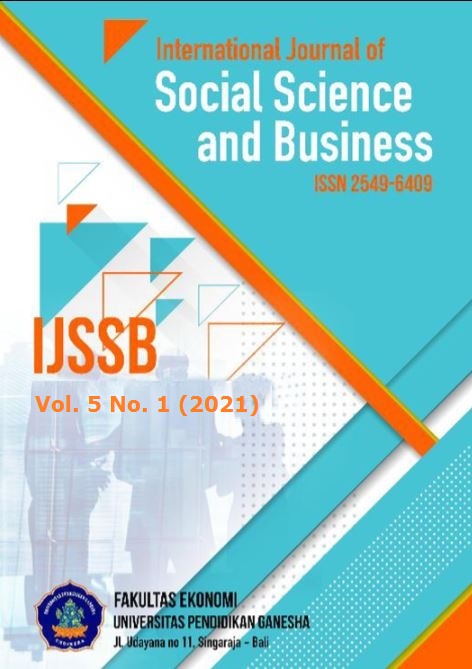Sustainable Tourism Development Through Improving the Role of Customary Village
DOI:
https://doi.org/10.23887/ijssb.v5i1.30778Keywords:
customary, development, tourism, villageAbstract
This study aims to analyze the potential of the Customary Village in tourism development, its position, and function in Bali Province. This research is a socio-legal study with a legal and case approach, legal analysis techniques in the form of legal hermeneutics and is analyzed through the theory of legal pluralism, and the concept of recognition of the Customary Law Community. This research was conducted in the area of Bali Province based on local wisdom with the concepts of Parahyangan, Pawongan, and Palemahan. The system and implementation of customary law, institutional Sabha Customary Village and Kerta Customary Village, custom advisory institutions, religion, traditions, arts, and culture, as well as local wisdom of indigenous peoples. Pasraman as an educational institution based on Hinduism for the development of identity, moral integrity, and quality of Balinese society, traditional village security institutions, and traditional village economic institutions by the principles and objectives of tourism, namely the welfare of the community. Especially the Krama Customary Village. The results showed that the Balinese Customary Village in tourism development is an autonomous Balinese customary institution, traditional cultural communities, indigenous peoples, and the collective identity of the people in Bali based on customary law to achieve common goals based on the Tri Hita Karana.
References
Adnyani, N. K. S., & Purnamawati, I. G. A. (2020). Pengarusutamaan Gender Krama Istri (Warga Perempuan) dalam Hukum Adat Bali. Pandecta Research Law Journal, 15(1), 26–43. https://doi.org/10.15294/pandecta.v15i1.18422.
Afrizal, & Nazaki. (2017). Peran Pemerintah Kabupaten Bintan dalam Meningkatkan Kemampuan Desa Terhadap Pengelolaan Kewenangan (Studi Pelaksanaan Kewenangan Desa Malang Rapat Dalam Mengelola Potensi Wisata). Jurnal Selat, 5(1), 88–104.
Antara, M., & Arida, N. S. (2015). Panduan Pengelolaan Desa Wisata Berbasis Potensi Lokal. Denpasar, Bali.
Antonov, M. (2016). The Legal Conceptions of Hans Kelsen and Eugen Ehrlich: Weighing Human Rights and Sovereignty (Law No. WP BRP 62/LAW/2016). Saint Petersburg (Russia).
Arismayanti, N. K., Sendra, I. M., Suwena, I. K., Budiarsa, M., Bakta, I. M., & Pitana, I. G. (2019). Tourism Villages’ Development in Bali, Mass or Alternative Tourism? Journal of Tourism and Hospitality Management, 7(2), 117–139. https://doi.org/10.15640/jthm.v7n2a11.
Arjawa, I. G. P. B. S., & Jayantiari, I. G. A. M. R. (2017). Democratic values in Balinese traditional society: Analysis of the making and the content of Desa Pakraman’s awig-awig. Masyarakat, Kebudayaan Dan Politik, 30(4), 428–436.
Budarma, I. K., & Suarta, K. (2017). The Role of Local Value in Global Sustainable Tourism Development Paradigm. The Case of Tourism in Bali. Journal of Business on Hospitality and Tourism, 2(1), 234–249. https://doi.org/10.22334/jbhost.v2i1.58.
Chang, H.-M., & Huang, H.-C. (2014). A Study of Indigenous Tourism Development- Case by Tamalung Tribe in Taiwan. The Journal of International Management Studies, 9(2), 87–94.
Dewi, P. S. T. (2019). Model of Sustainable Tourism Village Development in Bali (Case Study: OMunity Bali in Sudaji Village, Sawan Sub-district, Buleleng District). KnE Social Sciences. https://doi.org/10.18502/kss.v3i21.5001.
Diantha, I. M. P. (2017). Metodologi Penelitian Hukum Normatif dalam Justifikasi Teori Hukum (1st ed.). Jakarta: Kencana.
Gede, P. I. (2010). Tri Hita Karana-The Local Wisdom of the Balinese in Managing Development. Trends and Issues in Global Tourism, 139–150. https://doi.org/10.1007/978-3-642-10829-7_18.
Hoang, V. H., Tran, M. D., Tran, T. V. H., & Hoang, V. H. (2018). Regional Linkage in Tourism Development of Vietnam. Preprints, 1(1), 1–15. https://doi.org/10.20944/preprints201807.0578.v1.
Irfan, M., & Suryani, A. (2017). Local Wisdom Based Tourist Village Organization in Lombok Tourist Area. International Journal of English Literature and Social Sciences, 2(5), 73–82. https://doi.org/10.24001/ijels.2.5.10.
Kent, G. (1981). Community-Based Development Planning. Third World Planning Review, 3(3), 313–326. https://doi.org/10.3828/twpr.3.3.q07416r622q2uj02.
Klarin, T. (2018). The Concept of Sustainable Development: From its Beginning to the Contemporary Issues. Zagreb International Review of Economics and Business, 21(1), 67–94. https://doi.org/10.2478/zireb-2018-0005.
Mansuri, G., & Rao, V. (2004). Community-Based and -Driven Development: A Critical Review (World Bank Policy Research Working Paper No. 3209).
Nalle, V. I. W. (2015). The Relevance of Socio-Legal Studies in Legal Science. Mimbar Hukum, 27(1), 179–192.
Priambodo, B. B. (2018). Positioning Adat Law in the Indonesia’s Legal System: Historical Discourse and Current Development on Customary Law. Udayana Journal of Law and Culture, 2(2), 140–164. https://doi.org/10.24843/UJLC.2018.v02.i02.p02.
Purnamawati, I. G. A. (2018). Dimensi Akuntabilitas dan Pengungkapan pada Tradisi Nampah Batu. Jurnal Akuntansi Multiparadigma, 9(2), 312–330. https://doi.org/10.18202/jamal.2018.04.9019.
Purnamawati, I. G. A., & Adnyani, N. K. S. (2019). Peran Komitmen, Kompetensi, dan Spiritualitas dalam Pengelolaan Dana Desa. Jurnal Akuntansi Multiparadigma, 10(2), 227–240. https://doi.org/10.18202/jamal.2019.08.10013.
Resen, M. G. S. K., & Dyatmikawati, P. (2016). The Legal Status of Established Businesses in the Pakraman Village (From The Perspective of Customary Law in Bali Province). International Journal of Business, Economics and Law, 9(4), 1–3.
Sudibia, I. K., Sintaasih, D. K., Yuliarmi, N. N., & Marhaeni, A. A. I. N. (2017). Empowerment of Desa Adat Community to Support the Existence of Village Credit Institutions in Bali Province. Man In India, 97(11), 357–372.
Urbanus, I. N., & Febianti. (2017). Analisis Dampak Perkembangan Pariwisata terhadap Perilaku Konsumtif Masyarakat Wilayah Bali Selatan. Jurnal Kepariwisataan Dan Hospitalitas, 1(2), 118–133.
Yanti, A. A. I. E. K. (2019). Kewenangan Desa Adat dalam Pengelolaan Kepariwisataan Budaya Bali dalam Perspektif Peraturan Daerah Nomor 4 Tahun 2019 Tentang Desa Adat. Jurnal Hukum Saraswati, 1(1), 48–60.











